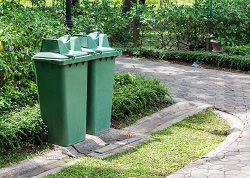The Transformation of Waste Management From Past to Present
Posted on 03/10/2025
The Transformation of Waste Management From Past to Present
Throughout human history, waste management processes have experienced dramatic transformations. Our journey from primitive dumping grounds to sophisticated, sustainable ecosystems is not only captivating but also pivotal for the health of our environment, societies, and future generations. This article delves deep into the evolution of waste management, examining how it has adapted through the centuries and emphasizing emerging trends that define today's waste solutions.

Understanding Waste Management: A Brief Overview
Waste management refers to all activities and actions required to handle waste from its inception to its final disposal. This encompasses processes from collection, transport, treatment, and disposal, as well as monitoring and regulation. Modern systems increasingly involve complex recovery and recycling methods as we move towards a more circular economy.
- Waste generation has increased substantially as populations have grown and consumption habits have changed.
- Sustainable waste practices are critical for environmental, social, and economic reasons.
The Past: Ancient and Early Waste Management Methods
Primitive Practices
In ancient times, the lack of organized waste management led to the accumulation of refuse in open spaces and waterways. Early humans likely disposed of organic waste simply by discarding it nearby.
- Dumping in Open Spaces: Most waste was left to decompose on land or in water sources.
- Burning and Burial: In areas where disposal was necessary, burning or simple burial were common practices.
The Rise of Organized Cities
With the emergence of ancient civilizations like Mesopotamia, Egypt, and Rome, the burgeoning urban population necessitated more systematic forms of waste disposal.
- Mesopotamians built the world's first waste collection systems, often using clay vessels lined along streets.
- The Romans developed rudimentary sewer systems, like the famous Cloaca Maxima, to transport human waste away from populated areas.
- Early Chinese cities mandated the collection of night soil (human waste) for use as fertilizer.
Despite these innovations, most historical approaches focused on moving waste out of sight, rather than recycling or environmental protection.
Industrial Revolution: The Birth of Modern Waste Practices
The Impact of Urbanization and Industrialization
The 18th and 19th centuries ushered in rapid urban and industrial growth. The influx of people into crowded cities led to unprecedented waste generation, including hazardous by-products from factories.
- Public Health Concerns: Epidemics such as cholera were linked to improper waste management.
- First Municipal Systems: Cities like London began to organize regular waste collection, street cleaning, and landfill usage.
Technological Advancements
The advent of the steam engine and mechanized collection fleets in the 19th century revolutionized how cities managed waste. The first engineered landfills and incinerators emerged, marking a shift towards more managed disposal.
- Mechanical garbage collection increased efficiency.
- Early incineration provided a means to eliminate waste and reduce landfill usage.
The Transition to Environmental Awareness (20th Century)
Acknowledging Environmental Consequences
The mid-20th century marked a turning point as indiscriminate dumping and incineration were recognized as major contributors to pollution and health hazards.
- Environmental Movements: Growing awareness prompted protests, the formation of environmental agencies, and new government policies.
- Landfill Regulation: More stringent design and monitoring standards for landfills were put in place.
Introduction of Modern Recycling and Recovery
Recycling initiatives became widespread in the 1970s and 80s, focusing on materials like paper, glass, metals, and later, plastics.
- Community recycling programs and deposit-return schemes for bottles began to flourish.
- Composting gained traction as a sustainable solution for organic waste.
The transformation of waste management systems during this period laid the foundations for the integrated, eco-friendly processes seen today.
Present-Day Waste Management: An Integrated and Sustainable Approach
Modern Strategies and Technologies
Today's waste management is characterized by an integrated approach that prioritizes waste reduction, reuse, recycling, and resource recovery.
- Material Recovery Facilities (MRFs): Automated centers sort recyclables from household and commercial waste streams.
- Waste-to-Energy (WTE): Incineration technologies now capture energy from waste, lessening landfill reliance.
- Advanced landfill management utilizes methane capture and leachate treatment to minimize environmental impacts.
The Rise of the Circular Economy Paradigm
The concept of a circular economy pushes beyond traditional waste management. It envisions systems where materials continually cycle back into use, reducing raw material extraction and waste.
- Product design increasingly considers recyclability and reusable packaging.
- Extended producer responsibility (EPR) policies hold manufacturers accountable for the entire lifecycle of their products.
- Zero-waste initiatives are gaining ground in cities and businesses worldwide.
Technological Innovations Shaping the Future
Digital transformation is key to contemporary waste management evolution.
- Smart bins equipped with sensors optimize collection routes and frequency.
- Artificial intelligence (AI) and robotics assist sorting facilities, increasing recycling rates.
- Mobile apps and online portals enable communities to participate in waste reduction and reporting.
Challenges and Opportunities in Modern Waste Management
Current Issues
- Plastic Pollution: Single-use plastics continue to choke oceans and overload landfill systems.
- E-Waste Management: The proliferation of electronic devices creates complex waste streams that require specialized handling.
- Global Disparities: Many regions still struggle with basic collection and sanitation services, exacerbating environmental and health issues.
Opportunities for Progress
- Policy and Education: Continued public education and progressive policies are vital for ongoing improvement.
- Innovation: Biodegradable materials, chemical recycling, and blockchain tracking offer new frontiers.
- Community Engagement: Grassroots movements and non-governmental organizations play critical roles in advancing sustainable practices worldwide.
The Environmental and Social Impact of Waste Management Transformation
The advancement of waste management practices has produced substantial benefits for both the environment and society:
- Reduced Land and Water Pollution: Improved disposal and treatment techniques prevent toxic substances from polluting ecosystems.
- Resource Conservation: Effective recycling preserves raw materials, lowering the ecological footprint of manufacturing.
- Public Health Improvement: Better waste management reduces exposure to hazardous waste and disease outbreaks.
- Economic Growth: The recycling and waste sector creates jobs and spurs innovation in green industries.
But challenges persist, especially in the form of increasing waste volume, emerging contaminants, and the need for global collaboration to address transboundary waste issues.

The Future of Waste Management: Emerging Trends and Technologies
Technological Advancements on the Horizon
- Advanced Sorting: AI-driven robots and hyper-spectral imaging will dramatically improve recovery rates of valuable materials.
- Bioengineered Solutions: Engineered microbes and enzymes may soon revolutionize the breakdown of plastics and other persistent waste.
- Decentralized Systems: Localized composting and energy recovery facilities can reduce transportation emissions and costs.
Policy and Behavioral Shifts
- Extended Product Responsibility: Requiring manufacturers to reclaim and recycle products fosters sustainable design.
- Consumer Awareness: Societal shifts toward conscious consumption and minimalism contribute to less wasteful lifestyles.
- Global Cooperation: Enhanced treaties and collaborative initiatives will be crucial to tackle planetary-scale waste challenges.
Conclusion: Waste Management's Ever-Evolving Path
The story of waste management transformation from past to present is one of continual adaptation and learning. From the rudimentary approaches of ancient civilizations to today's smart, circular waste ecosystems, the evolution reflects humanity's growing recognition of our environmental responsibilities.
As we look ahead, the future promises further breakthroughs--through technology, policy innovation, and public engagement--that can propel us towards a truly sustainable relationship with waste. Individual actions matter as much as collective initiatives in shaping the coming chapters of this global journey.
Key Takeaways
- From open dumping to smart recycling: Waste management has come a long way, driven by public health, environmental awareness, and technological innovation.
- Sustainability is the goal: Integrated and circular solutions now define modern waste strategies.
- Everyone plays a part: Policy, technology, and citizen engagement are all vital for ongoing progress in the evolution of waste management.
By appreciating the history and transformation of waste management, we can build on past lessons to secure a cleaner, healthier world for generations yet to come.

 020 3859 5580
020 3859 5580 020 3859 5580
020 3859 5580





 House Clearance
House Clearance Rubbish Collection
Rubbish Collection House clearance in London has never been easier, as Junk Removal Services can take care of your every need. From individual house junk...
House clearance in London has never been easier, as Junk Removal Services can take care of your every need. From individual house junk... With Junk Removal Services you can be confident that you’ll receive the most professional and affordable rubbish collection service within the London...
With Junk Removal Services you can be confident that you’ll receive the most professional and affordable rubbish collection service within the London...





